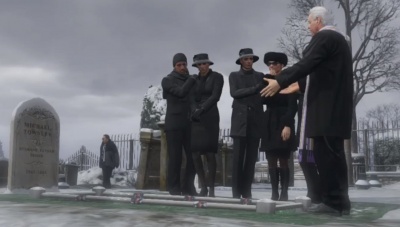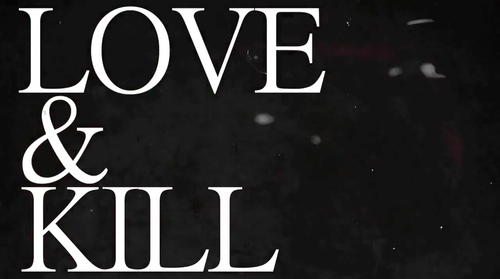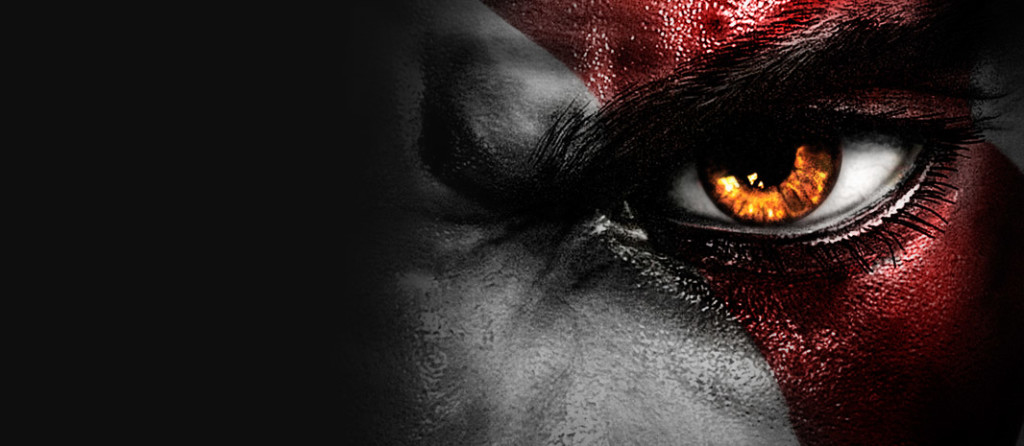Michael was not always a good husband. Not always a good citizen. He did not die a hero’s death. But he was a man. Our Lord was crucified with two thieves. So perhaps…we should not judge. We are born of sin, and we die in sin, and in this, Michael was like anybody else. Father, we do not know your infinite mysteries. But we know that you will show mercy to our friend.
Prologue, Grand Theft Auto V, as given in a eulogy for Michael’s “funeral”.
A medium goes through its own stages, at least in Western culture. First, they begin as the simple stories of old, weaving narrative and morals together like a grand tapestry of human culture. Then, as society develops, more distinctive forms of the traditional tale form in what we call “literature”. There’s nothing wrong with either form, of course; each has its own distinctive place in the pantheon of civilization. However, it is interesting to see the paradigms from one form carry on to the other.
I talk specifically of the nature of our stories. We can see this from the earliest forms of the novel as it developed from histories (the only acceptable form of story-telling in printed form, in any event) to the modern English novel. At first, stories contained rollicking high-adventure, but over time their boundaries widened. No longer did we need to cover the deeds of heroic figures; maybe we can just focus on one ordinary person. Cue the rise of Dickensian literature. Maybe we need to talk about our existential ennui, and perhaps our misgivings about current human existence: enter The Catcher in the Rye. Novels, popular or not, emerge in a time and place where they capture their era and its progress (not necessarily positive) to new forms of literary expression.
Most art tries, in its freest expression, to push the boundaries of society, to ask the unaskeable questions, and to set a question mark upon all that the artist’s contemporary world holds dear. In that sense, it is interesting that most sections of society turn into unlikable Puritans when it comes to artistic expression. Christians, obviously, have a reason to feel and act in response to such art, but we oftentimes turn too legalistic in our claims to “criticize” artistic works.
Let us hold the example of the “anti-hero”, the “bad guy” protagonist to set our own question mark against prevailing trends. You, no doubt, hear of the constant sexism, racism, questionable moral stance, and otherwise of the modern AAA games industry. This game, or that game, encourages these trends. Similarly, many saw the novel and the penny dreadful in tandem as the downfall of Victorian English society; they laid bare the hidden sins, the explicit sexuality (well, for that time), and the violent carousing of heroic thieves along with bad boy anti-heroes. Of course, your media will turn you into a devilish ghoul of a human being. Unfortunately for actual experience, no one seemed the worse for wear. Boys continued to play cowboys and Indians (no offense taken, I hope, with the use of the word “Indian”), people continued to enjoy themselves with high literature and low gutter trash alike.
Video games, it seems, arrived at and around this same point in time at a remarkably accelerated time table. It also emerged as an “art form” around the time when identity politics suddenly gripped the video game community in the throes of social justice as the White Savior Game Journalist attempts to shield everyone’s eyes from the evils within. Forget making a decision about the meaning and content of a game yourself! Thus, we see games with repugnant protagonists – Trevor (and everyone) from Grand Theft Auto V, Kratos from God of War, Mondo from Killer is Dead, and many others – critically hampered because the player must take the role of an unlikable person. A real dirt-bag. A total sleazeball! Ugh, why do I have to play this?
Did it ever occur to you that many forms of literature also retained these same characteristics? Nobody wants to be Macbeth; he’s a rather reprehensible human being by any standard, yet we hail the tragedy of the same name as a classic of world history. Why would Shakespeare force us to vicariously experience the life of Macbeth, whose life became a self-fulfilling prophecy of murder, guilt, paranoia, tyranny, and death? Why would J. D. Salinger force us to read the narcissistic ramblings of a teenager who lacks empathy for most everyone, calls everyone phonies, and is a phony himself? How could they do this to me? I don’t like this character, I don’t want to read/watch this! Ugh, these characters make me sick.
Obviously, that’s the whole point of said characters: self-reflection, not moral judgment. If you come into the text with controversy and such preconceived notions, you’ll not find much to enjoy, but you will certainly miss on what other human beings have created as a commentary on the human condition. I find it unfortunate that our leading critics cannot get it out of their head that a repugnant protagonist might exist not for the sake of making you play as the bad guy because it’s fun, but maybe because understanding and playing as the bad character may teach you something.
Grand Theft Auto V, the moral whipping boy of today’s framework, contains three thieves: Michael, Franklin, and Trevor. All of them, in their own way, some less and some more, evoke our common disgust at their immoral behavior. And yet, the entire game is framed with the quote listed above as Michael looks on, smoking his cigarette in silence. It tells us that we are not any different than they. We sin, as they sin. Our colors just tend to show in lighter shades.
And yet, our Lord was crucified with two thieves; that surely says something, right? And those very same thieves can find redemption if they so choose. In the infinite mystery of God’s love, we simply cannot understand how he could save them. None of them appear redeemable in any sense. How could they? Grand Theft Auto V makes us a participant in their sociopathic lives, but for what reason? To see that, even though we see them as reprehensible, and playing the game obviously confirms that fact, they do not remain beyond redemption.
32 Two others also, who were criminals, were being led away to be put to death with Him…39 One of the criminals who were hanged there was hurling abuse at Him, saying, “Are You not the Christ? Save Yourself and us!” 40 But the other answered, and rebuking him said, “Do you not even fear God, since you are under the same sentence of condemnation? 41 And we indeed are suffering justly, for we are receiving what we deserve for our deeds; but this man has done nothing wrong.” 42 And he was saying, “Jesus, remember me when You come in Your kingdom!” 43 And He said to him, “Truly I say to you, today you shall be with Me in Paradise.”
Luke 23
Really, you do not see this in the end. They aren’t redeemed in the end of the game, of course, and that they appear in the same place they were before. They develop friendships, yes, but little exists beyond that temporary good for their lives. Even as you see all the evil they do, you can have hope that things will get better. But it can’t be the temporal sort of hope; our protagonists reach far beyond that level. It must reach beyond to the sort of hope that inspires faith.
Given that framing, it’s no wonder the sermon exists in the game at all, and fits perfectly into the game’s themes of masculinity, satire, friendship, and sin. You’ll notice that the game does not, in any way, criticize mainstream religious belief at all. It does take jabs at Scientology and cult religion, but that’s been a hallmark of the series forever.
We can say the same thing for Mondo of Killer is Dead. Mondo represents the dark side of the James Bond character. In the movies, Bond drinks heavily, yet never gets drunk; he womanizes, yet never seems like a creep or a jerk just looking to sleep with attractive women. Mondo, on the other hand, looks like the exact opposite of the suave, sophisticated MI6 spy. The development team described the game with two words: Love & Kill – strangely relevant, given the divide between assassinations and the oft-criticized Gigolo Missions. As Goichi Suda, the director, says of the game:
James Bond is a secret agent, but generally he’s using his secret-agent powers to handle pretty public incidents. I like to think that there’s another world out there, a much seamier underworld that doesn’t connect to the surface world at all. I like to think there’s people who fight day and night in this world without ever registering with the public.
This dark side plays out not only in the criminal underworld of the game, but also in Mondo’s personality as a cold, brutish sort. Heck, killing’s just a day job for him, nothing more (you’d think a guy with a cybernetic arm and super strength would enjoy it). Rather, he really just wants to get women. A lot of women. Thus, the killing business is good and pay wells, so he does it, even though he has no reason why he woke up with a cybernetic arm. And he also loves hard-boiled eggs, for some reason.
Yet his ignorance of what’s happening around him in deference to his own hedonistic pleasures eventually catches up to him, and his path lays bare his fate. As he remembers more and more, the world becomes more complicated for him to the point where fleeting pleasures will not do, and he ends up paying a price for power that rocks his world forever. His inability to question the validity of his actions and to ignore the world around him produces quite the surprise (which I will not spoil, though this link will!).
Kratos is a simple enough case: his revenge was motivated by Ares, the “God of War”. Kratos, the ambitious Spartan warrior, fought many battles in his own lust for power, but eventually found hismelf outnumbered and outgunned. Saving himself by declaring servitude to the God of War, Ares took him up on the offer and plunged the famous “Blades of Chaos” into his arms. He made him into an unstoppable killing machine, continuing Ares’ conquest through the mortal realms.
To gain true coercive, violent power, you must remove all attachments.Only then can you truly conquer all in your way. Kratos still retained a family, a wife and child; Ares sees this as an impediment to true strength. During one of Kratos’ battles, Ares places Kratos’ wife and child in the village he assaults; he kills them both purely by accident, and it is here that Kratos revokes his service to War itself.
The other gods see Ares as a threat; they, too, see him wreck havoc for no reason but to show his worthiness; hence, he attempts to destroy what the gods of Olympus set upon the earth. Kratos, in his seething fury, serves the other gods for ten years, allowing his hatred and vengeful feelings to stir. The violence he commits and the women he beds cannot remove the memories, the anguish, and the torment of killing his wife and his only child. Even the god cannot remove the memories of his transgressions.
The events of the game, for its part, throw us into battle continually. It almost become, shall we say, monotonous towards its conclusion, much like Kratos’ attitude towards these means to an end. Surprise, he succeeds at this task (even after dying), but this doesn’t break his guilt nor solve his problems – instead, he is forced to take Ares’ place as a gift from the gods. Kratos rejects this gift by acting just like the God of War he becomes, and the cycle continues. Violence begets violence, and the gods of Olympus, ALL OF THEM, eventually meet their doom at Kratos’ hands. Not that much changes, as everyone dies. How else could it end?
In all these stories, you play horrible, despicable people. Some go through trauma, others through harsh life experiences, and other remain “bad to the bone”. Yet, there’s something to learn from all of them. The Bible itself has no shortage of such people, from Absalom (David’s son who started a coup, killed his own rapist/incestuous brother, etc) to Abimelech (kills all of his brothers for an inheritance – a far cry from Jacob, Judges 9:1-5). From them, we can learn much, especially NOT to do what they did. Yet, we can understand it as an outpouring of sinful influence in the world.
Let’s move beyond the hand-wringing and get into real human stories and literature, not dismiss things we do not like. That’s just stagnation. We do not do this to our sacred texts, so why not the sub-creations of human artistic endeavor?



